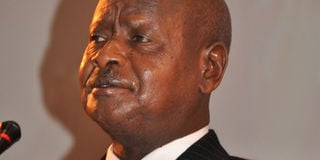Prime
Museveni signs Shs26b loan for Internet deal

What you need to know:
Plan. The project is part of an East African Community terrestrial fibre optic cable covering 15,600km to link the five member countries to the rest of the world
KAMPALA.
President Museveni has signed a loan for implementing the third phase of the National Backbone Infrastructure (NBI) and Electronic Government Infrastructure (EGI) projects.
The President who was in China for four days ending on Wednesday, penned the $9 million (about Shs26 billion) loan deal from Exim Bank. The President was accompanied by his wife Janet Kataha, Energy minister Irene Muloni and new minister for Works John Byabagambi.
He signed loans of up to $4 billion (about Shs12 trillion ), an equivalent of two-thirds of Uganda’s next financial year budget of Shs18 trillion.
The approval of the loan for the third phase of the NBI had been put on halt following a 2012 investigation by the Auditor General which pointed out government’s recklessness in procuring the contractor, Huawei Technologies, a Chinese firm, shoddy work and little value for money in the fibre optic cable project.
The whole project will cost Shs300 billion.
“When I hear your speeches, I am happy to know you are talking of a win-win situation, no chauvinism, no arrogance and your position as China has been constant. We are ready to work with China to ensure stability in the world and for UN reforms,” President Museveni told his Chinese counterpart, Xi Jinping.
President Jinping told Mr Museveni according to a statement from State House: “Your visit is very important. It has opened a new beginning of the China-Uganda relationships. It is result oriented and has achieved fruitful results.”
Other multi-million dollar loans signed included the first phase of the $8 billion (Shs23.5 trillion) Standard Gauge Railway, $1.2 billion (Shs3.1 trillion) for construction of an Industrial Skills Training and Production Centre and concessional loan agreements of $400m (Shs1.1 trillion) for revamping Entebbe International Airport, among others.
Mr Leonah Mponimba, a spokesperson of National Information Technology Authority, Uganda (NITA-U) which manages the NBI project, said: “Phase 3 shall involve further implementation of 756km of installed optical fibre cable and extend to the towns of Masaka, Mutukula, Mbarara, Kabale and Katuna.”
In 2006 Uganda received a $106m loan (aboutShs300 billion) from China for the NBI/EGI fibre optic project, with the implementer, Huawei, sourced singly. The project is part of an East African Community terrestrial fibre optic cable covering 15,600km to link the five member countries to the rest of the world.
Following the audit report, the President directed Prime Minister Ruhakana Rugunda to look into the findings. Mr Rugunda’s probe team recommended to the President the termination of Huawei’s contract.
ICT minister John Nasasira could not be reached by press time to establish whether Huawei will proceed with the third phase of the project or the government will procure another contractor. In the original loan contract, Huawei was to implement all the three phases of the project.



